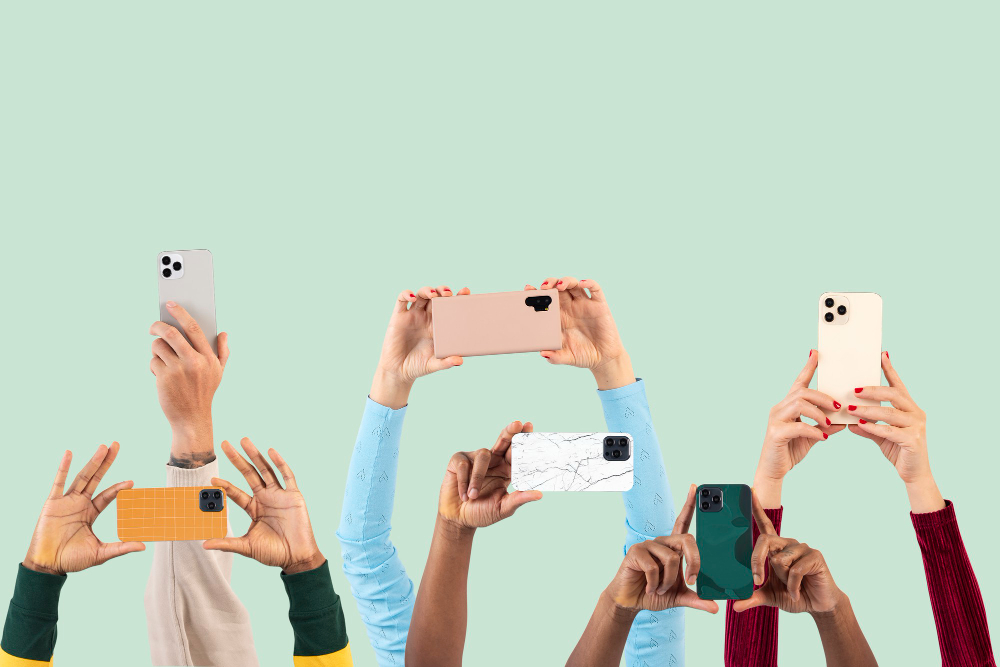Social media addiction – “You are being programmed”
A warning from Chamath Palihapitiya, former Facebook exec, “Dopamine-driven feedback loops we’ve created are destroying how society works”.
Did you know the average person scrolls the height of Big Ben in a day?
How often have you heard a notification *ping* and your fingers automatically tap to check your messages, and, before you know it, you’ve scrolled away minutes (or even hours) of your time in the blink of an eye?
Chamath explained how social media destroys your interpersonal relationships by “eroding the core foundations of how people behave by and between each other”. So, it’s not only about protecting yourself anymore. By being educated about the sinister side of social media, you can help your family, friends and others you interact with online.
We owe it to ourselves, our loved ones and everyone we interact with online to reign in our social media usage and become hyper-aware of how we’re using it and what we’re using it for.
In this article you’ll learn everything you need to know about how social media takes advantage of our physiology — because if you don’t know about how it works, how will you protect yourself?
You’ll get actionable steps to manage social media addiction, take back control of your mind from social media brainwashing and prevent eye strain from excessive screen use.
Social media: more addictive than alcohol and nicotine
The University of Chicago concluded this in a study where researchers monitored how well their 205 participants could resist the urge to check their social media over a week. They were given a mobile device and told to update the researchers every 30 minutes to express urges like smoking, drinking, sleeping and… the need to check social media.
The participants had to disclose whether they gave in to the temptations or not and describe how strong each desire was, ranging from “strong” to “irresistible”.
The results were shocking!
Researchers concluded that resisting the urge to use apps like Twitter, Facebook and other social media was harder to resist than smoking, drinking alcohol and even sleeping. So, internet addiction must be viewed with the gravitas of any other addiction, with appropriate therapies and systems in place.
In fact, multiple studies have shown a link between substance abuse disorder and Internet addiction. A University of Albany study showed that individuals who experienced excessive social media use were also more likely to report alcohol overuse and impulse control problems.
The ‘dopamine loop’
Dopamine is a feel-good neurotransmitter released in our brain to reward for doing something good. It’s released when we eat something we love, achieve our goals… or use social media.
Every like, retweet or funny video sends a flood of dopamine along your reward pathways. The result? A cycle of motivation, reward and reinforcement creates a loop to keep you scrolling and double-tapping, chasing your next dopamine ‘hit’ and often ignoring your real-life relationships and responsibilities.
When you realise that your quality of life is deteriorating, you can end up feeling guilty or depressed about your actions, which spirals you to double-down on social media usage to escape a difficult reality and chase dopamine in the easiest way you now know how — social media. When you repeat this pattern of relieving bad moods with social media use, that’s when a psychological dependency forms, similar to alcohol and drug abuse.
But it’s not your fault if you’re wasting too much time online and can’t kick it. Thousands of programmers are creating addictive algorithms to map your specific likes and dislikes and laser-target you with viral content with the sole purpose of keeping you in the app for longer. This creates a “filter bubble” that filters out everything that your activity does not align with and matches you with the same type of content over and over again to feed your addiction.
So how do we fight these algorithms that have been optimised over decades? It’s not easy, but it’s possible. Here’s how:
Beat social media addiction in 5 steps
-
Limit Social Media Usage
Set a daily limit for your apps to notify you when you exceed your social media usage for the day. This motivates you to spend your limited time more wisely e.g., spending time on content creation rather than consumption.
-
Don’t Sleep with Your Phone
Place all electronics like tablets, phones and laptops outside of your bedroom at least two hours before you sleep. It will make you less likely to use social media before bed, which is a common habit, and will help your circadian rhythm to improve the quality of your sleep.
-
Limit Phone Usage
The ‘do not disturb’ setting on your phone is your best friend! Put it on when you are engaging in deep work, studying or focusing on a task for any reason. A cheeky check of your notifications may seem harmless, but you’ll be shocked with how productive you can be with 2-3 hours of uninterrupted work.
-
Develop your Interests
Take up a new hobby that has nothing to do with technology. You can choose anything: from playing tennis to taking cooking classes. You will receive dopamine from your achievements, reinforcing that other things can make you happy too. “You are not stressed because you are doing too much”, says Daryus Panthakey, Founder of Accuvision, “You are stressed because you are doing too little of what makes you feel most alive.”
-
Dopamine Detox
Let’s bust a myth right now. You can’t “detox” from a naturally occurring brain chemical, but you can rewire your brain to kick its dependency on cheap, unproductive dopamine sources. Try to go 3-5 days with minimal social media usage. Use an actual alarm clock instead of your phone, turn off notifications and deactivate your social media accounts. In this time if you find your hands itching to check your notifications or look at a reel, you may be addicted to social media and should seek extra help, perhaps from family, a trusted friend or a therapist.
Computer vision syndrome
Do you get headaches, dry eyes, blurred vision or neck and shoulder pain? Left untreated, these computer vision syndrome (CVS) symptoms can recur more often, worsen with screen time, and even present themselves after stopping digital screen use. Here’s why:
Digital screens often make your eyes work harder than if you were reading a printed page. Since your eyes don’t blink as frequently when looking at digital devices, the film of tears protecting the surface of your eyes will evaporate faster, causing eye irritations like burning and stinging.
Contact lens wearers, beware: Chronic dry eyes may seem temporary and harmless but can make your contact lenses more prone to tearing and subsequent infection.
Glare, reflections on the screen and high contrast pages make viewing more difficult, putting further strain on your eyes. The strain is even worse if your eyes have been unproperly corrected — uncorrected vision, astigmatism and presbyopia (age-related long-sightedness) can all aggravate CVS.
Unfortunately, many opticians and eye care specialists provide subpar treatment. Free consultations, 2 for 1 offers and cheap deals undervalue quality optometrists and create an environment of uninspired care for your eyes.
Our #1 advice to combat CVS is to find the best quality eye care.
6 tips to combat computer vision syndrome
We won’t tell you to stop using your devices. In our Information Age that’s neither practical nor helpful. You may rely on your phone and laptop to work, relax and socialise — that’s fine. But here’s some things to do if you’re experiencing CVS symptoms more frequently:
-
- Improve your room lighting. Make sure your room lighting isn’t brighter than your screen, or your eyes will have to strain harder to see. Adjust your room lighting or change the brightness/contrast on your screen to ease eye strain.
-
- Use a blue light filter. Excessive blue light disrupts your circadian rhythm and can negatively affect your vision and general health over time. You can restrict how much of it enters your eyes by activating your phone’s blue light filter or getting eye glasses with blue light lens tints.
-
- Minimize glare. Use glare reduction filters, reposition your screen or use blinds to reduce bright light shining directly onto your laptop. Also keep your screens clean! Wipe away dirt, dust and fingerprints to decrease glare and improve clarity.
-
- Optimise for an ergonomic setup. Keep your desk at a height of about 26 inches – so that the top of your screen is slightly below eye level. Get a comfortable chair that supports your spine and an ergonomic keyboard and mouse.
-
- Use the 20-20-20 rule. Every 20 minutes of screen time, look at something at least 20 feet away for 20 seconds. This will help you avoid prolonged periods of screen time which can cause eye strain.
-
- Take breaks through the day. Do activities that don’t involve using your phone. Make a mental note of any habits you’ve formed where you automatically take out your phone e.g., immediately after waking up.
The dangers of digital media for your eyes
CVS is the tip of the iceberg in how digital media overuse can damage your eyes. Our Digital Age comes with countless implications for our health and eyes that we simply haven’t researched enough yet, especially in terms of long-term effects.
But here are some of the lasting effects that could impact you or your children with increased use:
-
- Less focus flexibility. Your eye muscles could weaken as they grow accustomed to staying focused on stationary objects, affecting your ability to quickly change focus on close-up and far targets. This could also mean your eyes react more sluggishly to light.
-
- Your eyes can get fatigued — causing double vision, headaches and difficulties in concentration from intense use. These symptoms can manifest at unpredictable times, and could cause accidents, for instance, when driving, working heavy machinery or managing important tasks.
-
- Near-sightedness. Excessive screen time can keep children indoors, having long-term implications on their eye health. For children, natural daylight is crucial for developing healthy eyes. Studies have shown that children who spend more time indoors are more likely to develop
Social media abuse ruins lives
Research has linked severe psychological injury – including severe depression, anxiety and sleep deprivation – and self-harm resulting from excessive social media use in all age groups.
According to a 2017 study, 4.5% of young adults suffered from social media addiction, with devastating long-term mental and social health consequences: Facebook’s own research even showed that 12% of its users engage in compulsive use of social media, affecting their work, sleep, parenting and relationships.
Daria J. Kuss found that just like other addictions, social media addiction can lead to:
-
- Escapism
- Obsession
- Neglect of personal life
- Mood modifying experiences
- Concealing the behaviour from others
- Increased tolerance leading to increased usage
Social media is dividing us
“Social media is no longer social, nor media” explains Anthony Silard, author of The Art of Living Free. A large claim but one that is becoming truer by the day. Its “social” nature has diminished as addictive algorithms isolate us from everyone with differing opinions to ours (causing an echo chamber effect that fuels ideas that may have otherwise had little merit).
Decades ago, people watched the news and viewed the world through the same sources and with the same basic facts. We still thought in different ways about issues of the day, just like in any democratic society, but at least we had some common ground on which to base our discussions. And so, we were able to settle on informed common ground through more meaningful cross-angle dialogue and debate.
Now our views are based on which influencers we follow, and what posts are fed to us, on social media:
What view do these thought leaders have on the pandemic, climate change and other political, social and economic issues?
What do the top comments on their posts have to say on the matter? And, of course, top comments are upvoted by the echo chamber, with the vast majority of people sharing similar opinions to accounts they follow, courtesy of social media algorithms.
On top of that, comments with 10 upvotes often rise quickly to 100 because of people attributing value to a comment purely based on the number of likes it has. Think hard, how many times have you instinctively liked a comment purely based on the number of likes it already has?
Extreme views are growing and healthy debate declining
The Pew Research Centre conducted a study outlining the “spiral of silence” — where people are less likely to speak up about policy issues in face-to-face situations or online if they felt that their point of view is not widely shared. Think about it. How often have you sought out an opposing point of view to the one that is fed to you by your tailored social media algorithm?
How often do you engage in respectful debate with a comment that you don’t agree with?
So extreme voices go unchallenged because of our reluctance to voice our views. And we adopt these extreme views wholesale, such that there is no longer any middle ground — and our echo chamber reinforces it.
Social media has divided us on a level unlike anything we’ve ever experienced before. So, what is its role anymore? David Greenfield, Director of the Centre for Internet and Technology Addiction, explains it as, “The only reason social media exists is really to keep your eyes on screens to sell you stuff. That’s the model.”
Social media brainwashing
How can you tell if you’ve been brainwashed? Delusion, despite multiple people opposing your ideas with facts and evidence, is a red flag. The next time you get defensive, even when others are providing contrary solid evidence, to the point that you even get disrespectful towards them, you have been brainwashed.
It’s our collective responsibility as social media users and human beings to identify when ourselves and others fall victim to brainwashing, and to facilitate escape from it. One way to help a victim is to ask questions and show genuine curiosity. You can question their convictions in a non-attacking manner to aid their self-realisation.
Non-judgemental, compassionate and respectful dialogue is the way in which we should interact with not just the brainwashed, but the rest of our world too.







